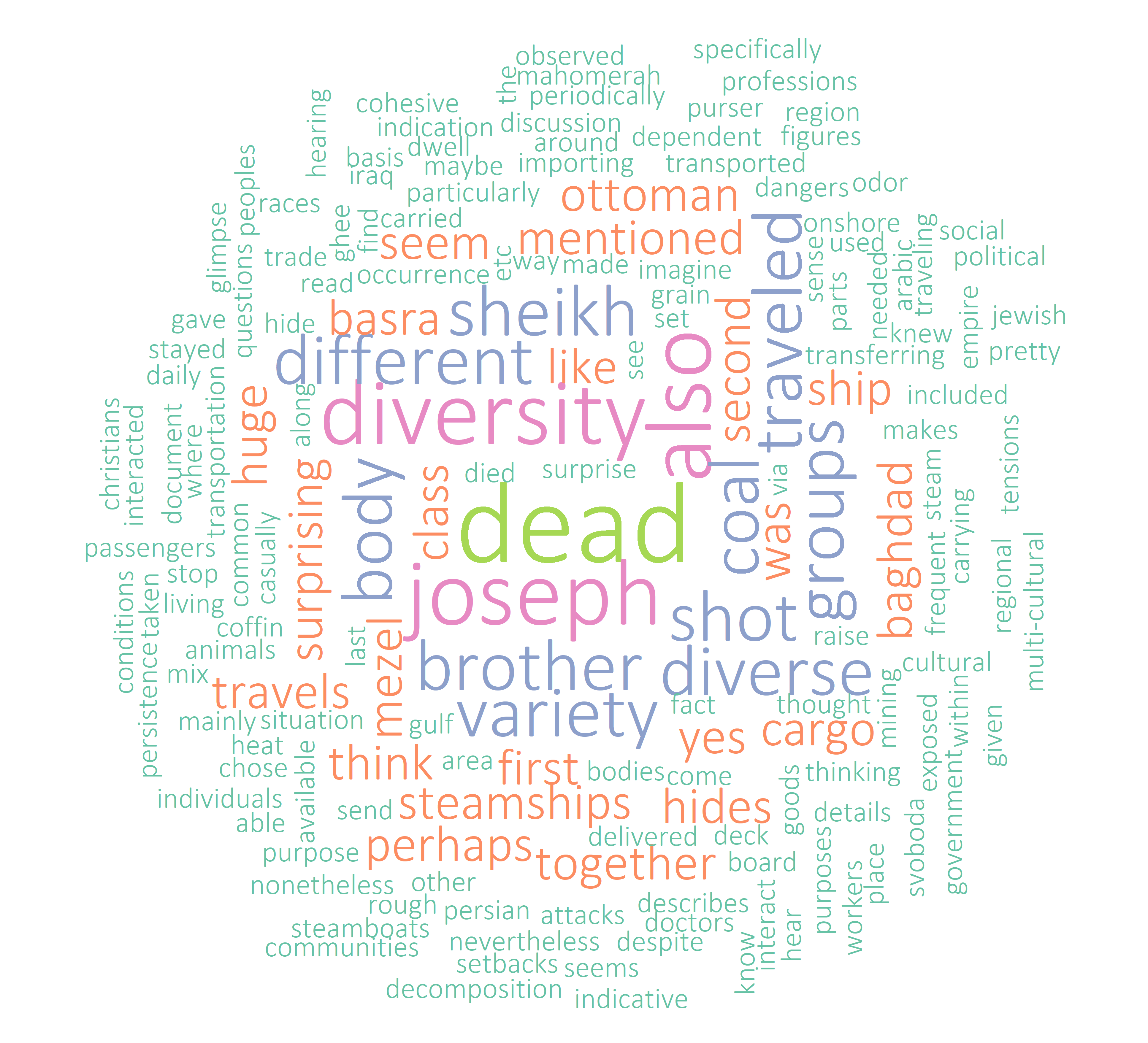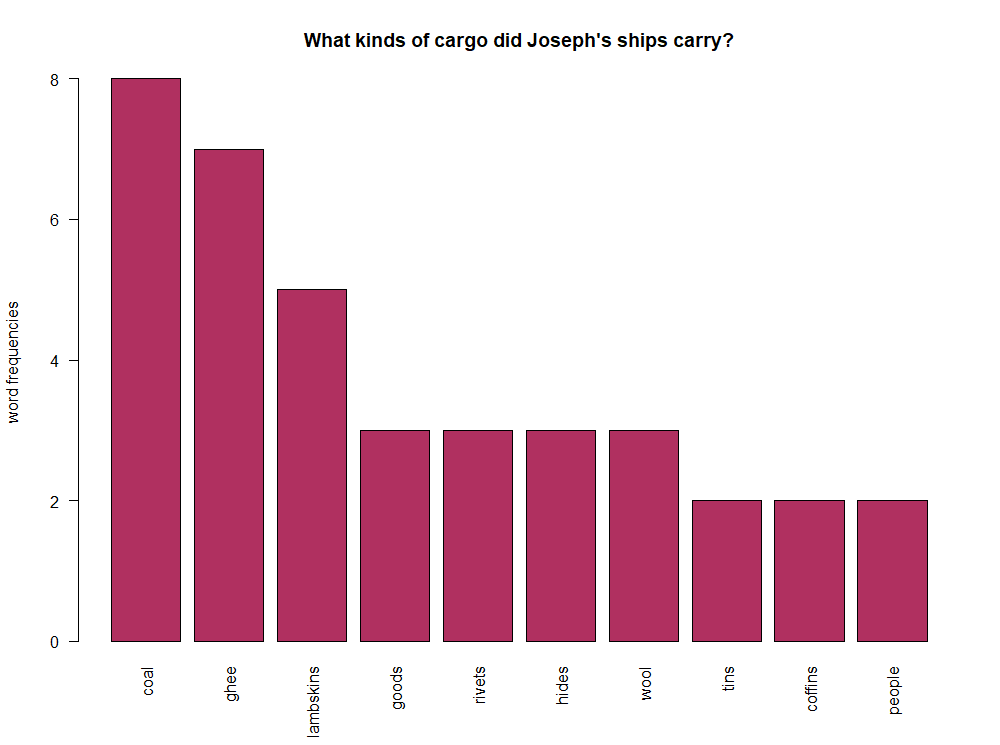Contest Summary | Week 1 | Week 2 | Week 3 | Week 4
Week #2 Steamship Industry Answers
April 26, 2021
You all gave great answers to this week’s questions! You can read about your answers for each question below. To show the answer to each question, click on the plus sign icon next to it. To hide the answer, click on the minus sign icon.
2. Joseph often describes the passengers on the steamships. Who – individuals or groups – uses the steamships and why?
People took different approaches to answering this question, with some answers focusing on specific names and others focusing on the categories of people Joseph describes.

Answers mentioned doctors, various kinds of Ottoman officials, shaykhs, priests, foreign travelers. Several responses specifically picked out Dr. Z Yèronimakis, who was coming to work for the quarantine administration in Baghdad.
As one response pointed out, almost all the people Joseph identified by name or profession were traveling in a first- or second-class cabin. Practically-speaking, that means they were paying anywhere from three to seven times more than the cost of a third-class (deck) ticket.
Like many people, Joseph was sensitive to social status and class – his own and others’. He was relatively well-off, and many first- and second-class passengers were his friends and relatives. Other people he noted by name were high-status because of their profession (government official, doctor); their social status (shaykh) or their wealth (merchants).
Part of the reason Joseph was able to record the passengers in so much detail was that his job – purser – included checking over and recording the tickets of everyone on board. In addition, cabin passengers could, and often did, pay a little extra to “mess” (eat) at table with the officers of the ship, Joseph included, giving him an opportunity to socialize with them beyond simply recording their tickets. And, while most of the ship’s manual laborers – people who shoveled coal into the engines, for example – were locals, most of the officers were English. Joseph, who spoke Arabic, English, Italian, and French fluently (at minimum) and was conversant in several other languages, was able to have meaningful interactions with people of varied backgrounds – though, again, he was mostly interested in wealthy, high-status people.
3. Were you surprised by any of the people who traveled on the steamships, or the cargo they shipped?

People were very surprised by the fact that the ship was carrying the dead body of Shaykh Miz‘al, and by Joseph’s matter-of-fact description of his murder at the hands of his brother. Miz‘al was the shaykh of Muhammerah (now Khorramshahr), a city in southern Iran just across the border from Iraq, south of Basra. The assassination is shrouded in some degree of mystery to this day. But what is clear is that it was instigated by the shaykh’s younger brother Khaz‘al, who immediately seized power.
Regardless of the political circumstances and fallout, the dead body was on the ship en route to Karbala. Karbala, and the neighboring city of Najaf, are two of the holiest and most important shrine cities for Shi‘i Muslims. Because of that, many Shi‘is choose to be buried there, which means having their bodies sent there after death. In the Ottoman period, when dead bodies were thought to spread diseases like plague and cholera, this caused a great deal of diplomatic tension with majority-Shi‘i Iran. Still, people found ways around the restrictions. And while coffins holding ordinary people usually traveled by mule or donkey, the Tigris steamships often carried the coffins of prominent Iranian and Indian Shi‘is to Baghdad, en route to Najaf or Karbala.
Many people were also surprised by the diversity of people who traveled on the steamships, in terms of both religion and place of origin. Iraq, at the time the diary was written, was quite diverse. According to the official Ottoman numbers for 1900, Baghdad was about 18% Jewish, 2% Christian, and 80% Muslim. For comparison, Seattle today is about 52% Christian, 37% “nothing,” 1% Jewish, and 1% Muslim, among other identifications.
Scholars today disagree about what this kind of diversity meant for people’s daily lives. Did Baghdadis mostly socialize with people who shared their identity? Or was life mixed in a more comprehensive way? One thing that is clear from Joseph’s diaries is that steamships were a space where significant social mixing did occur, at least for wealthy and high-status people. And because of his job and language skills, Joseph was in a position – perhaps more than many other people – to move in mixed social circles and interact with people of many different backgrounds.
Featured Answers
- “They ship quite a wide variety of cargo such as coffins, specie, coal, hides, jam, rivets, ghee, lamb skins, and many people. This all comes from Basreh and places on the way from Basreh to Baghdad such as Amara, Ali Gherbi, etc.” – Midori Komi, in response to question one
- “In one particular journey, there were 125 passengers total. In first class, there was an English officer traveling from Persia named Major C.S. Cumberland, who seems to be an athlete of some sort and has been traveling for eight years already. Joseph also described 2 Persian ladies who are the wives of Yacoob and Yousif, sons of Eassayi who are traveling to Basreh. The third Persian is someone named H. Abdulghani Khdery, who is returning to Amara. In second class, Joseph documents an Assyrian priest, Kass Yousif ibn Georjieh, and his mother, who are ‘going to replace Kass Toma Bahi’.” – Catherine Oei, in response to question two
- “The most surprising was the dead body of Sheikh Mezel of Mahomerah, shot by his brother. Perhaps it would have been interesting to hear more about what had taken place there, but Svoboda doesn’t seem to dwell on it.” – Alex Chen, in response to question three
